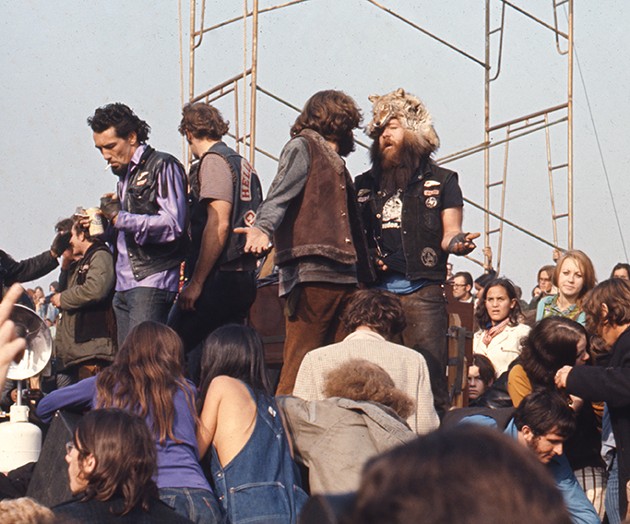click to enlarge

A melee broke out on Dec. 6, 1969 in front of the hastily constructed stage at the
Altamont Speedway as the Rolling Stones played "Sympathy for the Devil." Several Hells Angels jumped into the crowd. Sawed-off pool cues came down on skulls and boots broke bones. Somewhere in all the dust and tangled humanity was the glint of a gun followed by the flash of a blade.
Mick Jagger in a two-tone satin blouse resembled a frightened harlequin as he struggled to calm a crowd of 300,000 people, many of them hard tripping on acid, mescaline and Lord knows what else.
"Everybody be cool now," he said after getting Keith Richards to stop riffing on a slightly out-of-tune guitar.
"People! Who's fighting and what for?" he pleaded.
Unknown to the Stones at the time, Meredith Hunter, an 18-year-old African American man from Berkeley, was stabbed and beaten to death right in front of the stage during that break in the music.
Albert and David Maysles acclaimed documentary,
Gimme Shelter (1970), appears to show the violence of the Altamont concert unflinchingly. In the film, Jagger and Charlie Watts stare sadly at a moviola showing footage of Hunter jerking a revolver from his green suit right before a Hells Angel stabs him in the neck. Even with the knifing, however, veteran Chronicle rock critic Joel Selvin doesn't think "Gimme Shelter" goes far enough.
"The story is much more grim, much more sordid, much more violent," Selvin says during a phone interview.
"The movie is tampered the most, I suspect, by the fact that the Rolling Stones themselves were partners in the movie," Selvin explains. "I'm sure the filmmakers felt those eyes over their shoulders."
Selvin spent over 20 years researching the Altamont fiasco for his latest book,
Altamont: The Rolling Stones, the Hells Angels, and the Inside Story of Rock's Darkest Day (Dey Street Books, 2016), and he comes to some harsh conclusions.
"The blame is much more directly on the Rolling Stones and the decisions they made than the movie would allow," Selvin says.
The Stones originally planned their "Woodstock West" for Golden Gate Park, but when that fell through, it was booked at Sears Point Raceway (now the Sonoma Raceway). That deal also hit a snag when
Filmways, the Sonoma-based movie company that owned the speedway, found out that the free show at their track was going to provide the third act of a concert movie the Stones were making. Filmways attempted to negotiate exclusive distribution rights for the movie or $100,000 to walk away from it.
Filmways executives "did not believe the Stones when they said this movie's profits were going to charity" according to Selvin. "The Stones utterly refused to negotiate with them."
With barely 24 hours before show time and VW vanloads of hippies streaming into Northern California from as far away as New York, the concert was moved to the Altamont Raceway in between the then cow towns of Tracy and Livermore. Maximizing the potential for future chaos, the Hells Angels were promised $500 worth of beer to work security, and $500 bought a lot of Hamm's in 1969.
With the concert held in Altamont, no particular Hells Angels chapter held jurisdiction over it, so the place became what Selvin describes as "a complete mob scene of Hells Angels from all over the area." Many of the bikers causing problems in front of the stage were prospects from the newly formed San Jose chapter.
But violence was contagious at Altamont that day, and Hells Angels weren't the only ones causing trouble.
"People were shoving and pushing a lot," Karen Blackstock recalls. Blackstock lived in Berkeley at the time and got to Altamont early that day. She had dropped acid with Mickey Dolenz of the Monkees at the
Monterey Pop Festival in 1967, and was expecting another "fabulous" concert like Monterey Pop. She found a "nightmare of horribleness" instead.
"The fact that they had it way over in the East Bay, there was a whole rougher crowd of people that came to that than if it had been over in San Francisco," she explains.
Mick Jagger was punched right after he got off the helicopter. Marty Balin of the Jefferson Airplane was knocked out onstage during his band's set. Rex Jackson, the Grateful Dead's road crew chief, was assaulted moments later. Denise Jewkes of the band Ace of Cups was hit in the head with a full bottle of beer, and needed cranial surgery without anesthesia. She was pregnant at the time.
"If Jesus had been there, he would have been crucified," a "forlorn" Mick Jagger later told the Associated Press.
Meredith Hunter wasn't the only one to die at Altamont that day. Mark Feiger and Richard Savlov, two 22-year-olds from Berkeley, were crushed to death in their sleeping bags when a Plymouth plowed into their campfire. Another young man drowned in an irrigation ditch.
While Altamont is often talked about as "the end of the 60s," Selvin is quick to point out that "it did take place in Dec. 1969."
"I don't think Altamont was the end of anything," he says, "but it certainly was a great loss of innocence."
Joel Selvin will be appearing at the
Great American Music Hall (859 O'Farrell St.) on Tuesday Aug. 16 at 7:00 p.m. for the official book launch party featuring Rudy Colombini and The Unauthorized Rolling Stones. Copies of Selvin's
Altamont will be available for signing from Green Apple Books.